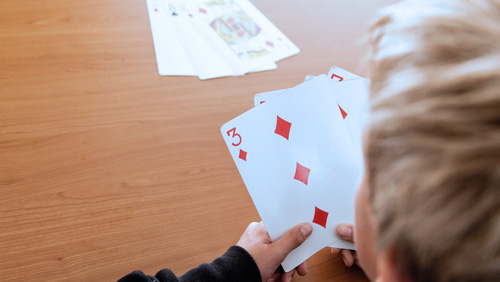Researchers at Deakin University in Victoria, Australia have revealed that children between the ages 8-16 see gambling as a ‘normal’ part of a sporting event, and they remember details of betting promotions even believing that you cannot lose when gambling.
I have a photograph of my boy long before he could walk. He is on the floor of my living room, propped up by pillows, a dummy stuck in his mouth, and the reflection of a giant TV screen glittering in his eyes.
 There was no thought behind that decision.
There was no thought behind that decision.
It was a way of escaping the manic life of a parent.
Today, I know that decision was dumb. Television is not entertainment. It’s the most efficient form of brainwashing humanity invented. It’s never a good idea to have your beliefs and values shaped by imagery emerging from a machine called an idiot box.
Several years later, when he was all grown up, I asked him to pick a horse in the Grand National. It won at odds of 100-1. I still remember us both bobbing up and down as if we were riding the winner home.
Fast forward.
I am a gambling addict with more debt than I care to imagine. My son is now 10-years old. I sit him down and have a chat. Not the birds and the bees chat, not the pornography chat, not the drugs and alcohol chat, not the smoking chat, not the what are you going to do when you are old chat, but the gambling chat.
I had to tell him that although his Dad gambled, and that he was privy to all of my wins, that I lost far more than I ever won, and never told him.
And that’s what I was thinking about this morning when I read that Deakin University researchers in Geelong, Victoria had conducted a study of children aged between 8-16 to understand the way gambling advertising affected them.
The Australia and New Zealand Journal of Public Health published the study. It stated that children as young as eight could recite brand names of gambling companies, and details of promotions.
Researchers were eager to understand if the ads for bonus bets and cashback offers stuck in the minds of the kids – and they did. Co-author of the study, Associate Professor Samantha Thomas, believes that the promotions claiming big wins based on certain sporting outcomes lead children to believe that you can’t lose from gambling.
I get it.
A year after my son had won the Grand National with that 100-1 shot, he had already planned out how he would spend his winnings before the race had started. Fortunately, for me, his horse refused to move when the race began.
The gambling industry in Australia spent $145m on promotions last year making it the fourth biggest splash of marketing cash in the country. The study revealed that watching gambling ads has become a ‘normal’ part of watching sporting events for children. Bet365, Sportsbet and TAB were the three brands children remembered the most.
Bet365 is the shirt sponsor of the English Premier League (EPL) side Stoke City, another interesting dynamic when it comes to taking your child to watch an EPL game on a Saturday afternoon. Like the researcher’s state, you can’t hide these images from your kids.
Is It Time For a Law Change?
The architects of the study are now pushing for a law change to mitigate the influence gambling ads have on the children of Australia. Gambling ads are allowed to be played with G-rated time slots as long as they are contained within the content of the sporting event, and they would like to see this law changed to add more protection to children.
But it’s not just gambling ads that influence the way our children behave.
The study also showed that children who were not deliberately marketed to are still exposed to the marketing of products. Take your kids to the cinema and ads containing sweets dominate. When they get older, alcohol takes over. The Facebook News Feed algorithm can alter the outcome of political events. It’s a part of our culture.
You can’t lock your children up.
It’s impossible.
But you can sit them down and talk about the hidden dangers of advertising and educate them about gambling and the rest of the vices that make our hearts beat that little bit faster, so they have all of the facts before they make their decisions in life.
Or.
Prop them up amongst the pillows and hope an ad comes on the TV that will do your job for you.